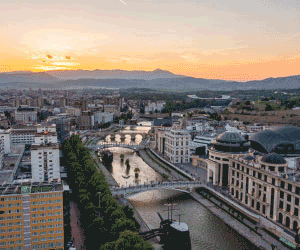A funeral ceremony is being held today in Lisbon for the Aga Khan IV, the spiritual leader of the world’s Shi’ite Ismaili Muslims who passed away in Portugal on February 4 at the age of 88. He will be laid to rest tomorrow in a private burial ceremony in Aswan, Egypt. Known for balancing religious leadership with philanthropic and business endeavors, the Aga Khan’s international development projects helped improve the lives of Ismailis and many others in some of Asia and Africa’s poorest regions. Born Prince Karim al-Husayn Shah in Geneva on December 13, 1936, the Aga Khan succeeded his grandfather at the age of 21 as the 49th imam of the Ismailis, a multiethnic community that is scattered across several countries in Africa, Asia, Europe, and North America.
There are at least 2.5 million Ismailis in the world, with some estimates going as high as 15 million. The largest Ismaili community is in Tajikistan’s Gorno-Badakhshan region. The Aga Khan was a history student at Harvard University at the time of his succession, which he said changed his life overnight, presenting him with “serious responsibilities toward millions of other human beings.” He founded the Aga Khan Development Network (AKDN) — one of the largest private development projects in the world — that invested in many fields, including education, health care, rural development, and microfinance, as well as in cultural initiatives. The projects — implemented in partnership with governments, organizations, and communities — provided employment opportunities and economic self-reliance, as well as better education and health care for the very poor. In media interviews and speeches, the Aga Khan said that one of the “continuing objectives” of his projects was trying to improve people’s quality of life and to contribute to the elimination of poverty.

The Muslim leader, who endeavored to present moderate Islam and promote religious tolerance, said assisting the poor by providing them economic opportunities would help prevent extremism. The Aga Khan said that in some of the poorest regions of the world, violence and terrorism “come from poverty” and that “changing the basics of the quality of life and [by] replacing despair with hope” would help stop the situation “from becoming explosive.” He often called on his followers and their leaders not to exclusively help Ismailis but anyone who is in need. The Aga Khan has seen his Ismaili community and many of his philanthropic projects and properties face difficult challenges in volatile regions around the world. Most recently, the Tajik government appropriated several major AKDN properties — including a hotel, a private school, and a city park — in the restive Gorno-Badakhshan region.
The autonomous province is home to some 250,000 people, most of whom identify as Ismailis. The AKDN has invested in many business, development, and charitable projects in Gorno-Badakhshan and other parts of Tajikistan for more than three decades.
Material Riches
Along with the hereditary title of the Aga Khan, he also inherited a vast fortune. The net worth of the Aga Khan has been estimated between $800 million and several billion dollars. In 2009, Forbes put the Aga Khan among the 15 richest royals in the world and reported that the horse-racing enthusiast owned “900 thoroughbreds at stud farms in Ireland and France” and held a stake “in Goffs, one of Britain’s largest horse auction houses, as well as the French horse auction house Arqana.” The Aga Khan has also been known for a jet-setting lifestyle and was the owner of opulent residences, a multimillion-dollar yacht, and aircraft, though he denied he led a “lavish” lifestyle. Some of his opponents accused him of not being a complete or pure Muslim because of his lifestyle. Famous for his high-placed connections, the Aga Khan was often photographed with world leaders, presidents, and royals.
The Aga Khan’s private life — including his two marriages and divorces — always made headlines in Western media. The Aga Khan’s first marriage was to a British woman, Sarah Croker Poole, who converted to Islam, changed her name to Salimah Aga Khan, and assumed an aristocratic title of begum upon her marriage. The couple, who had three children, divorced after 26 years of marriage in 1995. The Aga Khan then married Gabriele Homey of Germany in 1998 and became a father again at the age of 64 in 2000. The imam and his second wife — also known as Begum Inaara Aga Khan — separated in 2004. The couple officially divorced in 2014 after a lengthy legal battle over a divorce settlement. The Aga Khans’ immense wealth partially comes from tithe-style donations by well-to-do members within the Ismaili community. His successor as the next spiritual leader of Ismailis was designated in his will, which will be read in the presence of his family and religious leaders before the name is publicly announced. No date has yet been announced.






































